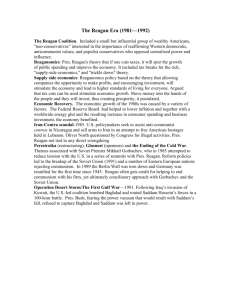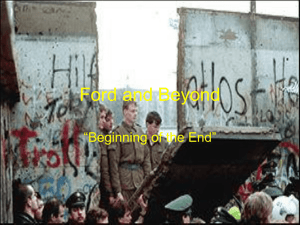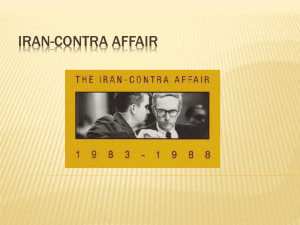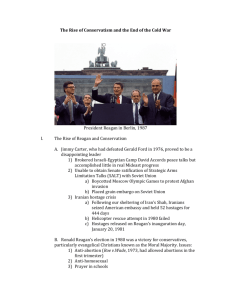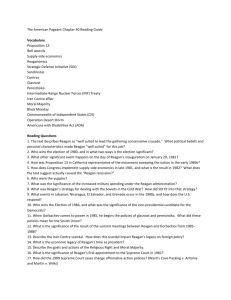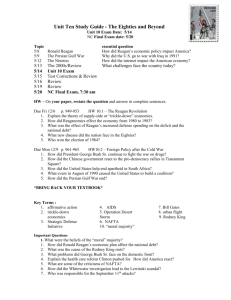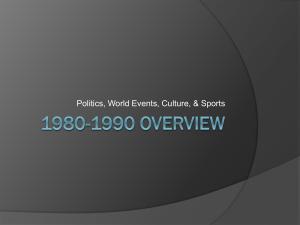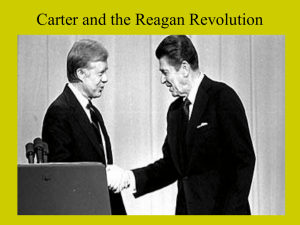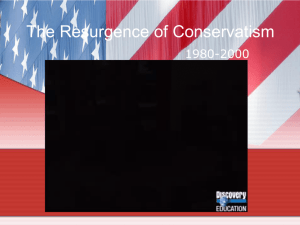Reagan & the Court
advertisement
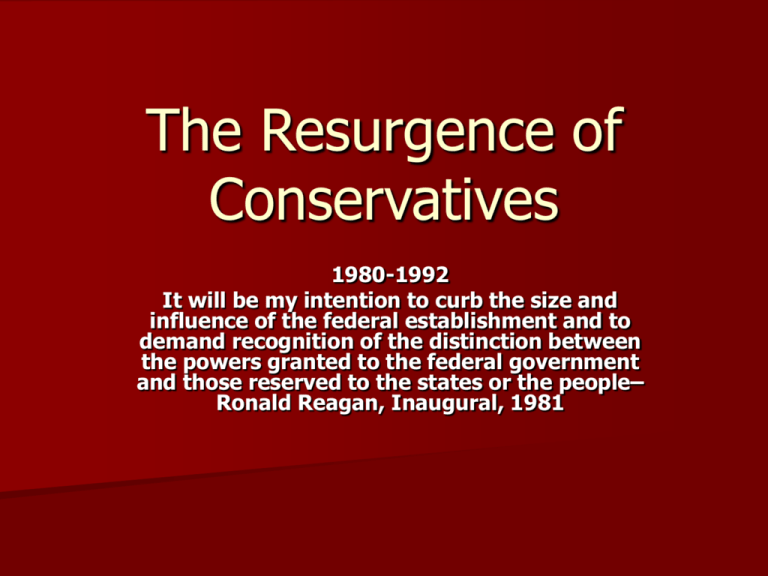
The Resurgence of Conservatives 1980-1992 It will be my intention to curb the size and influence of the federal establishment and to demand recognition of the distinction between the powers granted to the federal government and those reserved to the states or the people– Ronald Reagan, Inaugural, 1981 The New Right 1. 1. Average American older than in the 1960’s More likely lived in the South & West Suspicious of federal government power Energized by evangelical Christian groups (Moral Majority-led by Pastor Jerry Fallwell) Moral Majority – Social conservatives; railed against abortion, pornography, homosexuality, feminism, & affirmative action- advocated school prayer etc. Registered 2-3 million voters in a couple years; raised $millions for candidates. “The Old Right”- economic conservatives; railed against welfare, affirmative action, government spending & size- for state's rights & free market “laissez-faire”. 1978- California Tax Revolt (Proposition 13) slashed property taxes & cut government services. The 1980 Election Republicans nominated Ronald Reagan; “It’s Morning in America” campaign slogan (G.H.W. Bush VP) Ronald Reagan: former B grade actor; Gov. Calif. Born & raised in a generation before the 1960’s Early political hero- FDR (DEMOCRAT!) Championed the common man against Big Government Hoped to win working class & lower Middle-class voters- linked the Democratic Party to BIG GOVERNMENT. Influenced by “Neo-Conservatives” led by Irving Kristol- free market capitalism (Laissez-faire) President Carter’s Problems Problems abroad- Iranian hostage crisis Problems at home- double-digit inflation, energy crisis, appeared inept. “ABC Movement”- people in the Democratic Party who wanted anyone to run except Carter. Liberal Democrats wanted Edward (Ted) Kennedy Carter & Kennedy fought for the Democratic nomination Issue that stopped Kennedy- Chappaquiddick The 1980 Campaign Ronald Reagan- acting skills & charm –advantage. Blasted Big Government of the Democrats, inflation, high interest rates (20% in 1980), slow economy. Since 1960 federal spending went from 18% of GNP to 23% US Optimism- America’s best years are ahead; antiSoviet, Pro-business, Pro-Christian. “Are you better off than you were 4 years ago?” Carter- accused Reagan of being a trigger-happy “Cold Warrior”- might bring war. 1980 Election Outcome Reagan- won 51% of popular vote Electoral Vote: Reagan 489 Carter 49 Republicans gained control of Congress -1st time in 25 years 1st time since Herbert Hoover (1932) a sitting President was voted out. “The Reagan Revolution” “Government is not the solution to our problems, it IS the problem…” American hostages in Iran released on his inauguration day. Goal- dismantle the welfare state & reverse the social upheavals of previous decades. “Reaganomics”: Trickle Down New budget cut spending by $35 million (social programs- food stamps & job training) Cut taxes 25% across the board over 3 years, cut estate taxes, new tax free saving for investors “Boll weevil” Democrats (southern conservative democrats) went along with Reagan’s budget The Economy by 1982 Economy in deepest recession since 1930’s Unemployment 11%-- bank failures US auto industry not selling enough cars (Japanese imports) Critics said cuts hurt poor & handicapped & favored wealthy 1983- ECONOMIC RECOVERY BEGAN! 1980’S 1ST time income gaps widened between rich & poor Middle class incomes stagnated “yuppies”- young, urban professionals (1.5 million prospering Americans) Assassination Attempt March 6, 1981- John Hinckley shot President Reagan (wounded him in left arm, collapsed lung) George H. W. Bush took over temp. (25th Amendment) Reagan recovered quickly (12 days later walked out of the hospital) Addressed the budget on TV a few days later. Effects of Reaganomics 1980’s prosperity founded on military spending. $2 Trillion over 1980’s decade US borrowed money to support spending Budget Deficits $100 Billion in 1982; $200 Billion each year after 1982 Gov’t borowing kept interest rates high= elevated value of the US dollar= good news for US tourists & buyers of foreign cars. Trade Deficit Increased- High US DOLLAR hurt US exporters= US trade deficit $152 Billion in 1987= US BECAME WORLD’S HEAVIEST BORROWER. Reagan Foreign Policy-The Cold War The Soviet Union is the “focus of evil in the modern world”Reagan “Peace through Strength”- Reagan would negotiate with USSR but only from a position of strength. Initiate a new expensive arms race with U.S.S.R. US could spend easier than USSR= U.S.S.R. would have to negotiate with avoid economic ruin. 1. Strategic Defense Initiative (SDI or “Star Wars”)orbiting battle stations in space that would shoot down Soviet missiles (“astrodome defense shield”) Some scientists advocated, others said it was science fiction. No matter- it caused the USSR much concern Reagan Foreign Policy- The Cold War 2. Poland (1981)- popular movement of working people – “Solidarity” LED BY Lech Walesa Communist Polish government enacted martial law Reagan enacted economic sanctions on Poland & USSR. 3. Aging Soviet Oligarchs- Soviet leaders tended to be old & in ill health. 1982-1985- 3 died 4. 1983- Soviets shot down Korean passenger jet in Soviet airspace. End of 1983- all arms-control talks with USSR OFF 1984- Soviet & Soviet bloc countries boycotted Olympics in LA Reagan & the Middle East Lebanon Israel- continued to allow new settlements to be built in “occupied territory” on West Bank. Invade Lebanon in 1982= armed chaos occurred 1983- Reagan sent US troops as part of peacekeeping force to Lebanon Oct. 1983- suicide bomber killed more than 200 Marines- US troops withdrawn= Reagan not damaged by this setback= “Teflon President” Reagan & Central America Nicaragua & El Salvador 1979-Anti-American Leftists (Sandinistas) overthrew dictator of Nicaragua- Carter ignored. Reagan accused Sandinistas of sending weapons to El Salvador (war torn area). US military advisors sent to strengthen El Salvadoran government Gave aid to the “Contra” rebels (opposing anti-American Nicaraguan Government). Grenada 1983 US invaded Caribbean island of Grenada Why? Military coup killed elected Prime Minister & Marxists came to power. US WON QUICKLY Election of 1984 Republicans re-nominate Ronald Reagan & George H.W. Bush Democrats nominated Walter Mondale & Geraldine Ferraro (1st woman on a major party ticket) Mondale hurt (VP in Carter administration) Reagan wins in a landslide 1984 Election Results Reagan 525 electoral votes; Mondale 13 Reagan’s Second Term 1. 2. Foreign Policy dominated Reagan’s 2nd Term 1985- Mikhail Gorbachev – new charismatic leader of Communist Party in USSR. Gorbachev initiated radical reforms in USSR Glasnost (“openness”) : introduced free speech & some political liberty. Perestroika (“restructuring”): revive Soviet economy by adopting free market reforms (profit motive & end subsidized prices. Required shrinking Soviet military & grow civilian economy April 1985- Gorbachev announced end INF targeting Western Europe. Geneva Meeting 1985 Geneva Summit 1985: 1st of 4 meetings Gorbachev & Reagan discussed INF elimination Nothing concrete Reykjavik, Iceland Summit Oct. 1986 –meeting #2 Ended in stalemate- no agreements Beginning of a genuine fondness between Gorbachev & Reagan The Washington Summit Dec. 1987- Meeting #3 *INF Treaty signed- banned all intermediate-range nuclear weapons from Europe. The Moscow Summit –May 1988 Reagan & Gorbachev praised each other A warm friendship was beginning Reagan & other Foreign Policy Moves Feb. 1986--Reagan administration backed Corazon Aquino who ousted dictator Ferdinand Marcos in Philippines. 1986-- Reagan attacked Libya in retaliation of Libya’s link to terrorist bomb attacks like an attack on a West Berlin nightclub that US soldier. *The Iran-Contra Scandal 2 problems: US hostages held in Lebanon & left-wing Sandinistas in Nicaragua Reagan asked Congress for aid to (Contra rebels) fighting Sandinistas- CONGRESS REFUSED 1985- US arranged arms sales to Iranians (Iran & Iraq at war)= Iranians would seek release of US hostages- Reagan vowed never negotiate with terrorists. Money from arm sales sent to aid CONTRAS in NicaraguaCONGRESS HAD FORBIDDEN THIS! Nov. 1985- news of secret deal broke Reagan denied knowledge of the deal Congressional investigation- led some to think Reagan senile, a poor manager of subordinates– Reagan was most likely in very early stages of Alzheimer’s. Reagan & the Court Reagan used the court in the “cultural wars” Demanded by the Religious Right (Moral Majority) Appointed almost a majority of all sitting judges by end of second term (appointed 3 in all) Appointed Sandra Day O’Conner -1st Woman on Supreme Court. Reaganism on the court: Assailed affirmative action & abortion Ward Cove Packing v. Antonia and Martin v. Wilks (1989)- court made it more difficult to prove an employer practiced racial discrimination. Congress passed law in 1991 that reversed decision. Reagan & the Court Abortion: Webster v. Reproductive Health Services (1989)- allowed states to legislate abortion to some degree. Planned Parenthood v. Casey (1991)- states can restrict access to abortion as long as they don’t place undue burden on the woman (Penn. Required minor child to notify parents- but did not have to notify husband). Reagan’s Legacy One of the most beloved & revered Presidents Eased regulations on Business Tax reform$2 Trillion in Deficits Median income declined (gap between rich & poor) Social programs cut COLD WAR PRACTICALLY ENDS Referendum on Reaganism? Nov. 1986- Republicans lost control of the Senate 1987- Senate majority Dem. Rejected Reagan appointee Robert Bork Democrats tried to make issues of: Iran-Contra, budget deficit, trade deficit **The Savings & Loan Scandal Falling oil prices hurt SW economy= low real estate values= 100’s of Savings & Loan were damaged. Federal bailout cost $500 Billion S & L’s pushed these loans off on 3rd World countries Oct. 19, 1987- Black Monday- Stocks plunged 508 pts. 1988 Election Democrats- had seven candidates (Seven Dwarves) Democrat frontrunner-Gary Hart (disqualified by sexual misconduct charges) Jesse Jackson- “Rainbow Coalition” Nomination- Michael Dukakis Republicans nominated George H.W. Bush (ran on Reagan’s coattails) –defense, tax cuts, anti-abortion “Read my lips no new taxes”- George H.W. Bush 1988 Election Results Bush Electoral votes-426, Dukakis -111 Foreign Affairs *Tiananmen Square Incident (1989)- 1000’s of prodemocracy demonstrators gathered. Presented a 30 ft. “Goddess of Democracy” China’s government sent troops & tanks against the crowd World opinion turned against China Bush maintained normal relations with China Eastern Europe Communist puppet regimes collapsed (Poland –August 1989) Dec. 1989- Germans danced atop Berlin Wall Oct. 1990- Germany was reunified Gorbachev vs. The Hardliners August 1991- Military coup against Gorbachev. Boris Yeltsin (president of the Russian Republic)helped Gorbachev defy the coup by surrounding him with 1000’s of supporters. Dec. 1991- Gorbachev resigned Soviet Union dissolved into 15 Republics loosely confederated into- Commonwealth of Independent States (CIS) – Yeltsin dominant leader. – Soviet Union in dustbin of history! Bush’s “New World Order”- democracy would rule & diplomacy replaces weaponry. Post Cold War Questions What about previous arms control agreements with US? What will happen to ethnic & religious conflict tamped down by Soviet rule? Which former Soviet Republic would control former USSR nuclear arsenal? 1993- Yeltsin & Bush sign *SALT II - both will reduce longrange nuclear weapons by 2/3 within 10 years. 1991-Yugoslavia- ethnic cleansing against minorities occurred. Eastern European Refugees flee to Western Europe 1990- Nelson Mandela released from S. African prison- 4 years later elected president. 1990- Free elections in Nicaragua- Sandinistas Out! What about the US after the end of the Cold War? Almost 50 years – Internationalist Policy followed Would US return to isolationism? How would the US economy be affected by movement away from military spending? 1991- Pentagon closed 34 military bases; canceled $52 Billion order for new planes (California hard hit) 1989- US invaded Panama & overthrew Manuel Noriega (drug trafficking-imprisoned in US until 2010- then sent to France to face charges). *The Persian Gulf War August 2, 1990- Saddam Hussein (Iraq) invaded Kuwait (would have allowed him to control 1/3 of world’s oil supply) UN Security Council: denounced the invasion-August 3 & demanded withdrawal of troops; international embargo followed. November- UN ultimatum- leave Kuwait by Jan. 15,1991 or else. UN force led by 539,000 US troops Jan 12- Congress voted to use force Feb. 23, 1991- land war began (Operation Desert Stormplanned by US General “Stormin” Norman Schwarzkopf lasted 4 days; Feb. 27- Saddam accepted a ceasefire. Saddam left in power! George H.W. Bush at Home 1990 ADA (Americans with Disabilities Act)prohibited discrimination against those with physical & mental disabilities. Water Projects Bill- reformed Fed. Subsidization of water in West- put environment ahead of agriculture. 1991- appointed Clarence Thomas to Supreme Court (African-American who criticized affirmative action)- opposed by liberal groups, unions, NOW. Accused by Law Professor Anita Hill - sexual misconduct Senate vote 52-48 to confirm him Bush & the economy More damaging to Bush than anything US economy stalled Unemployment exceeded 7% by 1992 US budget deficit $250 Billion in each year of Bush’s presidency 1990- Bush agreed to a budget that contained $133 Billion in new taxes- broke his 1988 campaign promise!
